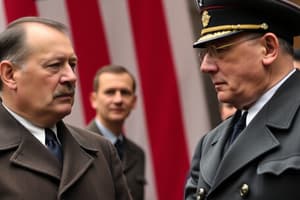Podcast
Questions and Answers
What was the primary motivation behind the Western Powers' pursuit of appeasement towards Hitler?
What was the primary motivation behind the Western Powers' pursuit of appeasement towards Hitler?
- To strengthen their alliance with the Soviet Union
- To gain territorial concessions from Germany
- To maintain peace by acceding to Hitler's demands (correct)
- To prepare for an inevitable war against Germany
Which statement accurately describes Neville Chamberlain's approach towards Hitler?
Which statement accurately describes Neville Chamberlain's approach towards Hitler?
- He believed that diplomacy with Hitler would be futile
- He sought to strengthen ties with the Soviet Union to counter Hitler
- He advocated for immediate military action against Germany
- He favored appeasement and ignored warnings about Hitler's threat (correct)
What event is cited as encouraging Hitler's further aggression and territorial expansion?
What event is cited as encouraging Hitler's further aggression and territorial expansion?
- The invasion of Poland in 1939
- Mussolini's invasion of Ethiopia in 1935 (correct)
- The signing of the Munich Agreement
- The formation of the Axis Powers
Which statement best describes the outcome of the Munich Agreement?
Which statement best describes the outcome of the Munich Agreement?
What was Chamberlain's defense for pursuing appeasement towards Hitler?
What was Chamberlain's defense for pursuing appeasement towards Hitler?
How did the British and French attempts at appeasement ultimately fare?
How did the British and French attempts at appeasement ultimately fare?
Study Notes
- After World War I, Europe faced a fragile peace threatened by Hitler's rise to power in 1933 as he crushed political opposition and made himself dictator.
- Hitler gained support in Germany by denouncing the Versailles Treaty's harsh terms and announcing German rearmament in 1935, violating Versailles.
- Western Powers pursued appeasement, hoping to maintain peace by acceding to Hitler's demands, despite his aggressive actions and expansionist goals.
- Chamberlain favored appeasement and ignored warnings about Hitler's threat, even after Churchill voiced concerns and called for British rearmament.
- In October 1935, Mussolini's invasion of Ethiopia encouraged Hitler, leading to further aggression and territorial expansion.
- Munich Agreement in 1938 averted war temporarily but was seen as a failure later as Hitler broke the agreement and took all of Czechoslovakia.
- Chamberlain's appeasement strategy bought time for Britain and France to rearm, but they were not fully prepared for the conflict that broke out in 1939.- Chamberlain advocated international summits to solve Cold War tensions after working with Stalin in WWII.
- Chamberlain was not a warmonger but saw Hitler as unreasonable and incapable of being persuaded.
- British and French attempts at appeasement failed due to Hitler's unreasonable behavior and belief in their weakness.
- Chamberlain's defense for pursuing appeasement was never heard as he died in 1940, unlike Churchill who defended his actions in WWII.
- Appeasement has been criticized for its failure to avoid war in the 1930s, leading to the belief that it only emboldened Hitler towards conflict.
Studying That Suits You
Use AI to generate personalized quizzes and flashcards to suit your learning preferences.





